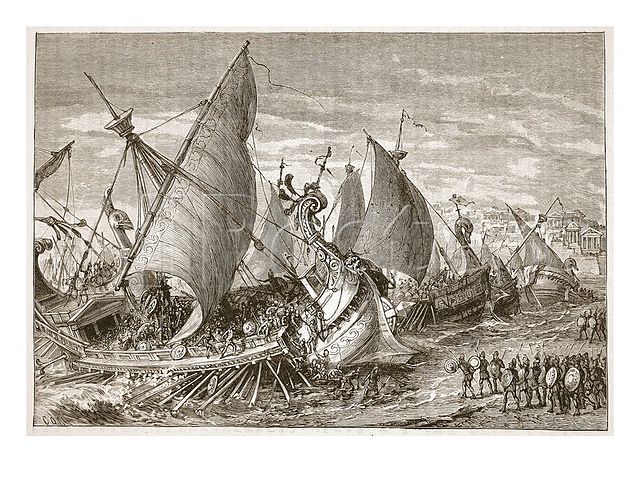Thucydides on the Outbreak of War
By Seth N. Jaffe
PhD Dissertation, University of Toronto (2012)

Abstract: This project illuminates Thucydides’ political thought through a novel interpretation of the first book of the History of the Peloponnesian War. It explores how Thucydides reveals the human causes of war through the outbreak of a particular war, the Peloponnesian war.
The primary claim is that Thucydides intends the breakdown of the Thirty Years’ Peace between Athens and the Peloponnesians, which inaugurates the great Peloponnesian war, to be understood by grasping how the characters of the Athenian and Spartan regimes contribute to the outbreak of the war and, crucially, how Athens and Sparta differently express human nature.
In broad outline, the History’s first book reveals how the regime characters of Athens and Sparta inform their respective foreign policies, but also how the interaction between the two cities—informed by the distinctive necessities pressing upon them—causes the Hellenic status quo to tremble and fall. Throughout the first book, while never obscuring the specific events triggering war, Thucydides progressively develops and expands his original statement that it was Spartan fear of Athenian power that compelled the fighting. The study argues that necessity (or compulsion) is the bright thread that Thucydides uses to guide his reader through the episodes of the first book, from the immediate causes of the Peloponnesian war to the human causes of war, from the particular events to the History’s universal themes.

Introduction: The following study explores the political thought of Thucydides through a novel interpretation of the first book of the History of the Peloponnesian War. It traces new paths through the thicket of the work’s opening 146 chapters, revealing how the outbreak of the Peloponnesian war sheds light on the causes of war in general and how these in turn explain the great conflagration. The importance of Thucydides’ first book has long been recognized. It introduces the History and sets the stage for the war. Why then is there the need for another study on the origins of the war? Doesn’t Thucydides himself tell us that the growth of Athenian power inspired Spartan fear, which made war necessary (1.23.6)? What could be clearer?

 Because of this apparently simple sentence, scholars of international relations have claimed Thucydides as their own, the archetypal realist, the first proponent of power politics, and a man preeminently interested in scientific causation in war. While Thucydides assuredly has much to say about the balance of power and the outbreak of war, his famous statement cannot be interpreted in isolation, nor, indeed, is it scientific in any contemporary sense. To start, it requires the History’s involved first book as supplement, which would mire these seekers after causal generalizations in the historical weeds, or, worse, in literary interpretation. Second, as we will see, Thucydides’ account is largely psychological, in no way bound up with efficient causation. The devil is in the textual details, in the manner Thucydides develops his argument about power, fear, and necessity through the unfolding episodes of the first book. His statement about the “causes” of war is a road-sign, not a destination.
Because of this apparently simple sentence, scholars of international relations have claimed Thucydides as their own, the archetypal realist, the first proponent of power politics, and a man preeminently interested in scientific causation in war. While Thucydides assuredly has much to say about the balance of power and the outbreak of war, his famous statement cannot be interpreted in isolation, nor, indeed, is it scientific in any contemporary sense. To start, it requires the History’s involved first book as supplement, which would mire these seekers after causal generalizations in the historical weeds, or, worse, in literary interpretation. Second, as we will see, Thucydides’ account is largely psychological, in no way bound up with efficient causation. The devil is in the textual details, in the manner Thucydides develops his argument about power, fear, and necessity through the unfolding episodes of the first book. His statement about the “causes” of war is a road-sign, not a destination.
Click here to read this thesis from the University of Toronto
Sponsored Content


Thucydides on the Outbreak of War
By Seth N. Jaffe
PhD Dissertation, University of Toronto (2012)
Abstract: This project illuminates Thucydides’ political thought through a novel interpretation of the first book of the History of the Peloponnesian War. It explores how Thucydides reveals the human causes of war through the outbreak of a particular war, the Peloponnesian war.
The primary claim is that Thucydides intends the breakdown of the Thirty Years’ Peace between Athens and the Peloponnesians, which inaugurates the great Peloponnesian war, to be understood by grasping how the characters of the Athenian and Spartan regimes contribute to the outbreak of the war and, crucially, how Athens and Sparta differently express human nature.
In broad outline, the History’s first book reveals how the regime characters of Athens and Sparta inform their respective foreign policies, but also how the interaction between the two cities—informed by the distinctive necessities pressing upon them—causes the Hellenic status quo to tremble and fall. Throughout the first book, while never obscuring the specific events triggering war, Thucydides progressively develops and expands his original statement that it was Spartan fear of Athenian power that compelled the fighting. The study argues that necessity (or compulsion) is the bright thread that Thucydides uses to guide his reader through the episodes of the first book, from the immediate causes of the Peloponnesian war to the human causes of war, from the particular events to the History’s universal themes.
Introduction: The following study explores the political thought of Thucydides through a novel interpretation of the first book of the History of the Peloponnesian War. It traces new paths through the thicket of the work’s opening 146 chapters, revealing how the outbreak of the Peloponnesian war sheds light on the causes of war in general and how these in turn explain the great conflagration. The importance of Thucydides’ first book has long been recognized. It introduces the History and sets the stage for the war. Why then is there the need for another study on the origins of the war? Doesn’t Thucydides himself tell us that the growth of Athenian power inspired Spartan fear, which made war necessary (1.23.6)? What could be clearer?
Click here to read this thesis from the University of Toronto
Sponsored Content